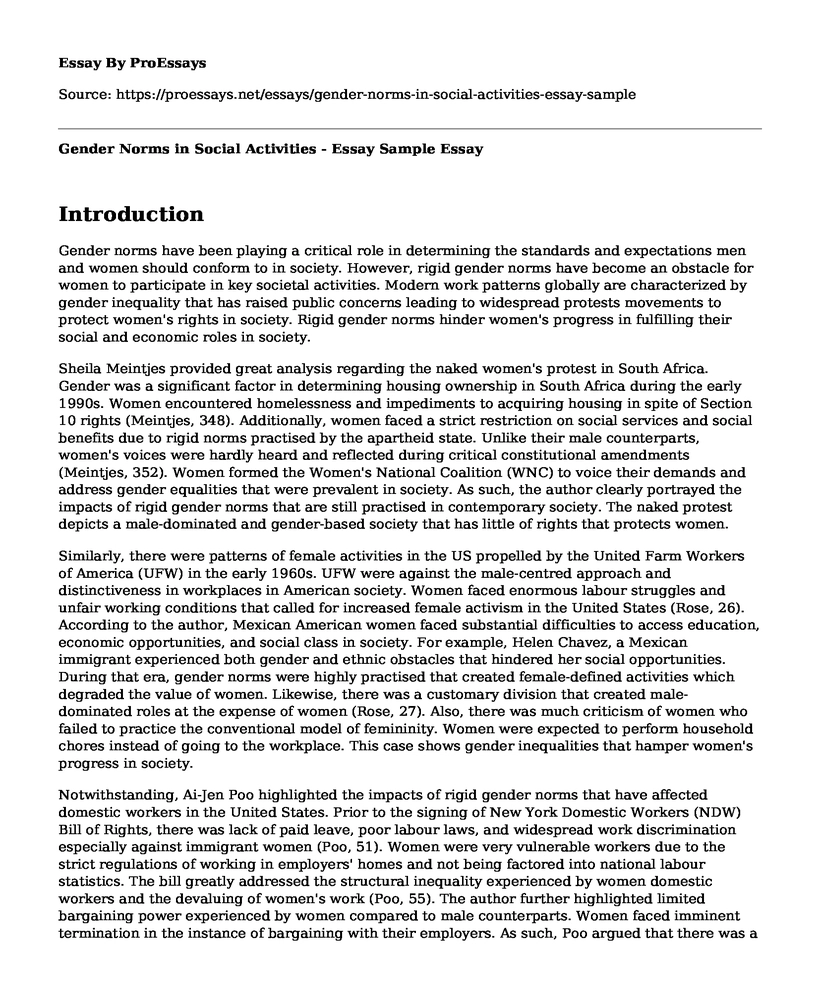Introduction
Gender norms have been playing a critical role in determining the standards and expectations men and women should conform to in society. However, rigid gender norms have become an obstacle for women to participate in key societal activities. Modern work patterns globally are characterized by gender inequality that has raised public concerns leading to widespread protests movements to protect women's rights in society. Rigid gender norms hinder women's progress in fulfilling their social and economic roles in society.
Sheila Meintjes provided great analysis regarding the naked women's protest in South Africa. Gender was a significant factor in determining housing ownership in South Africa during the early 1990s. Women encountered homelessness and impediments to acquiring housing in spite of Section 10 rights (Meintjes, 348). Additionally, women faced a strict restriction on social services and social benefits due to rigid norms practised by the apartheid state. Unlike their male counterparts, women's voices were hardly heard and reflected during critical constitutional amendments (Meintjes, 352). Women formed the Women's National Coalition (WNC) to voice their demands and address gender equalities that were prevalent in society. As such, the author clearly portrayed the impacts of rigid gender norms that are still practised in contemporary society. The naked protest depicts a male-dominated and gender-based society that has little of rights that protects women.
Similarly, there were patterns of female activities in the US propelled by the United Farm Workers of America (UFW) in the early 1960s. UFW were against the male-centred approach and distinctiveness in workplaces in American society. Women faced enormous labour struggles and unfair working conditions that called for increased female activism in the United States (Rose, 26). According to the author, Mexican American women faced substantial difficulties to access education, economic opportunities, and social class in society. For example, Helen Chavez, a Mexican immigrant experienced both gender and ethnic obstacles that hindered her social opportunities. During that era, gender norms were highly practised that created female-defined activities which degraded the value of women. Likewise, there was a customary division that created male-dominated roles at the expense of women (Rose, 27). Also, there was much criticism of women who failed to practice the conventional model of femininity. Women were expected to perform household chores instead of going to the workplace. This case shows gender inequalities that hamper women's progress in society.
Notwithstanding, Ai-Jen Poo highlighted the impacts of rigid gender norms that have affected domestic workers in the United States. Prior to the signing of New York Domestic Workers (NDW) Bill of Rights, there was lack of paid leave, poor labour laws, and widespread work discrimination especially against immigrant women (Poo, 51). Women were very vulnerable workers due to the strict regulations of working in employers' homes and not being factored into national labour statistics. The bill greatly addressed the structural inequality experienced by women domestic workers and the devaluing of women's work (Poo, 55). The author further highlighted limited bargaining power experienced by women compared to male counterparts. Women faced imminent termination in the instance of bargaining with their employers. As such, Poo argued that there was a need for moral arguments to address the rigid gender norms that had affected domestic workers in the United States.
Conclusion
Conclusively, gender norms are critical aspects that significantly affect women's social and economic opportunities. There are increased protests and uprisings that aim at curbing gender-based roles and male-dominated society globally. Women deserve equal labour rights for better economic prosperity in society.
Works Cited
Meintjes, Sheila. "Naked women's protest, July 1990: 'We won't fuck for houses'." Women in South African history (2007): 347-369.
Poo, Ai-Jen. "A twenty-first-century organizing model: lessons from the New York domestic workers bill of rights campaign." New Labor Forum. Vol. 20. No. 1. Sage CA: Los Angeles, CA: SAGE Publications, 2011.
Rose, Margaret. "Traditional and nontraditional patterns of female activism in the United Farm Workers of America, 1962 to 1980." Frontiers: A Journal of Women Studies (1990): 26-32.
Cite this page
Gender Norms in Social Activities - Essay Sample. (2022, Nov 21). Retrieved from https://proessays.net/essays/gender-norms-in-social-activities-essay-sample
If you are the original author of this essay and no longer wish to have it published on the ProEssays website, please click below to request its removal:
- Ethical Issue Analysis Essay
- How People Form Impressions of Who They Are and How Communication Affects Self-Perceptions
- Sex Differences in the Structure of Deception Detection Annotated Bibliography
- Paper Example on Speech Chain
- Essay Sample on Addiction Models: Sociological Construct Most Appropriate
- Parenting Styles: Permissive vs Neglectful - Essay Sample
- Race & Biology: 2,500 Yr Old Prejudices Still Persist - Essay Sample







